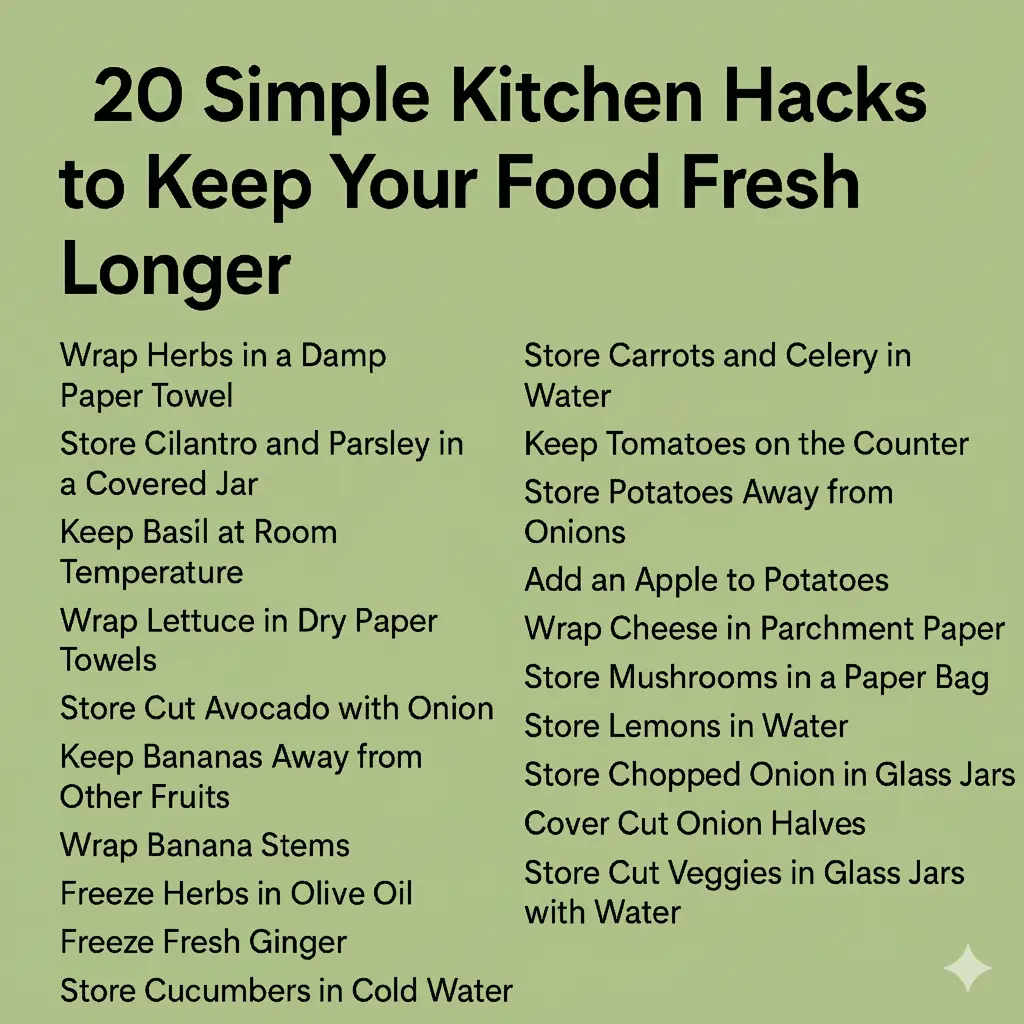Keeping food fresh doesn’t have to be a constant struggle or a game of racing against the clock. With just a few clever hacks, you can stretch the life of your groceries, reduce waste, and save money—all while making your kitchen run more smoothly. These simple tricks are easy to put into practice and will help you enjoy your produce, dairy, and pantry items for much longer.
Wrap Herbs in a Damp Paper Towel
Fresh herbs always seem to wilt faster than you expect. To keep them perky, wrap them in a slightly damp paper towel and then place them inside a resealable bag or container. The moisture keeps them from drying out, and the bag helps lock in freshness. I started doing this with parsley and cilantro, and it made a huge difference—no more slimy greens after just a few days.
Store Onions and Potatoes Separately
It’s tempting to toss all your root veggies together, but onions release gases that cause potatoes to sprout faster. Keep them in separate places, ideally in a cool and dark spot. I used to leave them side by side in a basket, and my potatoes went bad so quickly. Now that I keep them apart, they last weeks longer.
Keep Berries Dry and Ventilated
Berries are delicate and mold easily if they stay damp. After buying them, give them a quick rinse in a vinegar-water solution (one part vinegar to three parts water), dry them well, and store them in a container with a paper towel at the bottom. This slows down mold growth. I started doing this with strawberries, and they actually last through the whole week without turning mushy.
Flip Your Cottage Cheese or Sour Cream Tub
Here’s a quirky one: store your cottage cheese or sour cream upside down in the fridge. Doing this creates a little vacuum effect that slows bacteria growth. I was skeptical at first, but once I tried it, I noticed my sour cream stayed fresh for much longer than usual.
Use Mason Jars for Leafy Greens
Instead of leaving lettuce in its flimsy store packaging, transfer washed and dried greens into mason jars. The airtight seal keeps them crisp and fresh for days. I found that this hack not only keeps my salad greens crunchy but also makes them easy to grab and use—like a ready-to-go salad bar in the fridge.
Use a Paper Towel in Salad Bags
Bagged salad mixes often get soggy fast because of excess moisture. A simple trick is to tuck a dry paper towel inside the bag before sealing it back up. The towel absorbs the extra water and keeps the greens fresher for a few more days. I’ve done this with spinach, and it stretched its life just enough to finish the bag before it turned slimy.
Store Apples Away from Other Fruits
Apples release ethylene gas, which speeds up ripening in nearby fruits. While this can be useful if you want to ripen avocados quickly, it’s a problem for long-term storage. Keep apples separate in their own drawer or basket. Once I started doing this, my bananas stopped turning brown in just a couple of days.
Wrap Cheese in Parchment Paper
Cheese needs to breathe, but plastic wrap traps too much moisture and leads to faster spoilage. Wrap blocks of cheese in parchment or wax paper, then put them inside a loose plastic bag. The paper lets air circulate while still preventing the cheese from drying out. I learned this trick with cheddar, and it stays flavorful and fresh much longer.
Keep Bananas Together at the Stem
Bananas ripen faster when the stems are exposed. Wrapping the bunch’s stems with plastic wrap or foil slows down the release of ethylene gas. I once wrapped just half the bunch and left the other half bare—sure enough, the wrapped ones lasted nearly a week longer.
Freeze Leftover Fresh Herbs in Olive Oil
If you can’t use up herbs before they wilt, chop them up, put them in an ice cube tray, and cover with olive oil. Once frozen, you can pop out a cube whenever you need to cook. It’s a lifesaver for basil, parsley, or rosemary—you end up with fresh flavor on hand anytime without the waste.
Keep Tomatoes Out of the Fridge
Tomatoes lose their flavor and texture quickly when stored in the fridge. Instead, keep them at room temperature on the counter, away from direct sunlight. I used to refrigerate mine out of habit, but once I stopped, they stayed juicier and tasted so much better in salads and sandwiches.
Revive Wilted Lettuce in Cold Water
If your lettuce looks a little tired, don’t throw it out just yet. Dunk the leaves in a bowl of ice water for about 15 minutes. The cold water helps them crisp back up. I tried this trick on some romaine that I thought was done for, and it bounced back enough to make a fresh, crunchy salad.
Store Bread in the Freezer, Not the Fridge
Refrigerating bread actually makes it go stale faster. The freezer, on the other hand, preserves freshness. Slice your loaf before freezing so you can take out just what you need and toast it directly. I always do this with sourdough, and it tastes like it’s fresh from the bakery even weeks later.
Put Avocados in the Fridge Once Ripe
If your avocados ripen faster than you can eat them, pop them into the fridge. Cold storage slows down the process and gives you a few extra days to enjoy them. I’ve saved countless avocados this way—no more waste from brown mush.
Keep Celery and Carrots in Water
Chop your celery or carrots into sticks and store them in a container filled with water in the fridge. It keeps them crisp and snack-ready all week long. I do this on Sundays, and it makes grabbing a healthy snack so much easier during the week.
Keep Cucumber Ends Covered
Cucumbers often dry out quickly once sliced. Cover the cut end with a small piece of plastic wrap or place it in an airtight container. This keeps the moisture inside and helps them stay crunchy. I noticed mine stayed fresh for days instead of going soft overnight.
Separate Bananas for Longer Freshness
Instead of leaving bananas in a bunch, try separating them and storing each banana individually. This slows down the release of ethylene gas and keeps them from ripening all at once. I started doing this when I got tired of half the bunch going brown at the same time, and it worked wonders.
Store Fresh Ginger in the Freezer
Fresh ginger can shrivel fast if left out or in the fridge. Keep it in the freezer instead—when you need some, just grate it frozen. Not only does it last months this way, but it’s also easier to grate without the stringy texture getting in the way.
Use a Glass of Water for Fresh Herbs
Some herbs, like basil and mint, last much longer if you treat them like flowers. Trim the ends and place them in a glass of water on the counter or fridge, depending on the herb. I did this with basil once and it lasted over a week while staying fragrant and green.
Vacuum-Seal or Zip Bags Before Freezing
When freezing food, air is the enemy. Use a vacuum sealer if you have one, or press as much air as possible out of a zip bag before sealing. This helps prevent freezer burn. I started doing this with chicken and berries, and it makes a huge difference in flavor and texture when thawed.
A little bit of extra care can make a huge difference in how long your food lasts. Whether it’s wrapping herbs properly, separating certain fruits and veggies, or storing everyday items in smarter ways, these small habits add up to less waste and more flavor on your plate. Try a couple of these hacks the next time you unpack your groceries—you might be surprised at how much fresher your kitchen feels all week.


